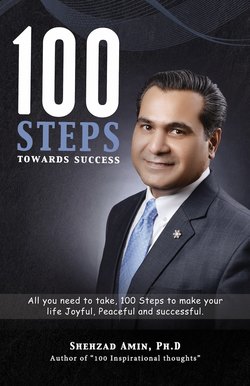Читать книгу 100 Steps Towards Success - Shehzad Amin PH.D - Страница 11
На сайте Литреса книга снята с продажи.
9. Forgive Yourself.
ОглавлениеStephen Richards said in his book Releasing You from the Past: “When you initially forgive, it is like letting go of a hot iron.” Beverly Engel, author of The Nice Girl Syndrome, said, “There is initial pain and the scars will show, but you can start living again.” Turn down the volume of your negative inner voice and create a nurturing inner voice to take its place. When you make a mistake, forgive yourself, learn from it, and move on instead of obsessing about it. As shown in a study conducted by Stanford University, mental and cardiac health may depend on your ability to reduce hurt and anger, even at yourself. It’s a project aimed at learning how forgiveness can enhance health and relationships, and even prevent diseases. It therefore means that the effectiveness of forgiveness cannot be overemphasized. Forgiving oneself should not be that hard, as it inhibits forgiving others. Did you cheat on your spouse? Hit a child in anger? Steal something? Go off the wagon? The list of potential human misdeeds is long. Equally important, don’t allow anyone else to dwell on your mistakes or shortcomings or to expect perfection from you”.
A lot of people struggle with self-condemnation or self-blame because they’ve either done something they feel was wrong and they feel guilty, or because they feel that they're wrong or defective in some way and they feel a sense of shame. — Everett L. Worthington
If someone else did these things, you might learn to forgive them, or at least let go of the anger. That's because it's easier to forgive others than to forgive yourself. After all, they don't live in your head, reading you the same old riot act. All the world's major religions preach the power of forgiveness. But forgiveness is such an elusive act – quicksilver in its ability to be strongly felt one moment and then dart away beyond reach the next.
The only way to move forward and progress in life is to leave the shackles of the past behind and charge forward. Kemi Sogunle said, “Without forgiveness and love, you will live with resentment, bitterness, malice and strife which result in more pain. You can never love without forgiving. Forgiveness deepens your ability to love and frees you from pain.”
According to Stanford's call for volunteer subjects, the definition of forgiveness is a simple one: not a near-impossible requirement that a person apply for sainthood. "Forgiveness," it says, "consists primarily of taking less personal offense, reducing anger, and the blaming of the offender, and developing an increased understanding of situations that lead to hurt and anger."
I have learned, that the person I must ask for forgiveness from the most is: myself. You must love yourself. You must forgive yourself, every day, whenever you remember a shortcoming, a flaw, you must tell yourself "That's just fine." You must forgive yourself so much, until you don't even see those things anymore. Because that's what love is like. — C. Joybell C
You must learn to embrace YOU in all entirety, believe in yourself, in this very moment, forgive yourself for all your flaws, mistakes, imperfections, and harmful decisions you might have made in the past. Never permit others’ judgment of who you were decades ago or years ago define who you are today. Each day opens new doors for healing miracles to occur in our lives. Embrace these miracles, big or small, even those you may presently be unaware of. Live in this moment, for this is all we have. Live in the light of all that is.”
In Everett Worthington’s book, Moving Forward: Six Steps to Forgiving Yourself and Breaking Free from the Past, he details six steps to take on the path to forgiving self.
1 Receive Forgiveness from the UniverseTake a step back and look at the big picture, not just those guilt-inspiring moments of your life. Remind yourself that everyone makes mistakes, and that you, too, deserve to be forgiven. If you have a spiritual practice, revisiting your teachings and growing your connection with your beliefs can also help you let go.
2 Repent and Repair Relationships That Were DamagedFor example, if you continue to feel guilt over causing a traffic accident, pay it forward by advocating for better safety precautions. If you regret not being there for your children when they were younger, ask what you can do now to make up for the past.
3 Reduce RuminationGiving past failures less time and attention is one way to help move forward. But you also need to examine the expectations and standards you hold for yourself. If you would forgive a friend for something, why hold a higher bar to clear for yourself?
4 Act Out a Ritual of Self-ForgivenessRecall the hurt this situation has caused. Then actually give yourself the empathy you would give someone else, along with an altruistic gift of self-forgiveness. It may help to go through a ritual of forgiveness. Write yourself a letter, give yourself the length of a hike to process your feelings one final time, or create a tangible expression of the painful experience, such as a sculpture in the sand or a pile of rocks in your garden, to commit to that self-forgiveness. Put time into this act and decide that when you are finished, you'll really let it go.
5 Embrace Self-AcceptanceEven after you've forgiven yourself, you may have a hard time coming to terms with your past mistakes. Accept what you can’t change. Remind yourself that actions don't define who you are. Getting stuck in the past makes it impossible to move forward to a better future.
6 Resolve to Live with More CareWe all make mistakes. By vowing not to repeat them, you'll have an easier time making amends with what's been done while being hopeful about what's to come.
